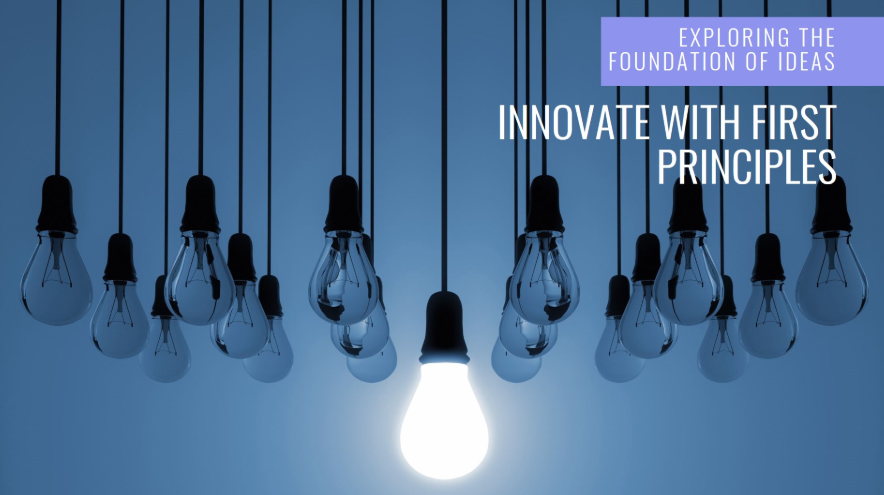Why First Principles Thinking Matters
First principles thinking is a problem-solving approach that breaks complex problems down into their fundamental truths. Instead of relying on assumptions, analogies, or conventional wisdom, this method encourages deep thinking and innovation by reconstructing ideas from the ground up. This approach has been widely used by some of history’s greatest thinkers, including Aristotle, Nikola Tesla, and Elon Musk.
2/15/20253 min read


By focusing on the foundational elements of a problem, first principles thinking allows for creativity, efficiency, and better decision-making. It helps professionals and innovators challenge existing paradigms and develop novel solutions rather than making incremental improvements. When applied correctly, it can lead to significant breakthroughs in technology, business, science, and everyday problem-solving.
How to Apply First Principles Thinking
Identify Assumptions – Recognize existing beliefs or accepted norms about a problem. Question why they exist and whether they are based on facts or just accepted because of tradition.
Break the Problem into Fundamentals – Strip away assumptions until you reach the core truths. These are the fundamental elements that remain when everything else is removed.
Rebuild from the Ground Up – Use these fundamental truths to create new, innovative solutions. Think about how these core elements can be arranged in a more efficient, cost-effective, or powerful way.
10 Practical Examples of First Principles Thinking
SpaceX and Affordable Rocket Launches
Conventional Thinking: Rockets are expensive and non-reusable.
First Principles Approach: What are rockets made of? What drives their costs? By analyzing materials and reusability, SpaceX drastically reduced launch costs and introduced reusable rockets.
Electric Vehicles (Tesla)
Conventional Thinking: Electric cars are slow, have limited range, and are impractical.
First Principles Approach: Batteries store energy, and efficiency can be improved with better materials and engineering. By focusing on battery innovation, Tesla developed long-range, high-performance EVs.
Airplane Design
Conventional Thinking: Planes should be designed based on past models.
First Principles Approach: What are the core elements needed for flight? Engineers focused on fuel efficiency, lightweight materials, and aerodynamics, leading to more innovative aircraft designs.
Healthcare and Drug Development
Conventional Thinking: Developing new drugs takes years and billions of dollars.
First Principles Approach: What are the essential steps in drug discovery? By using AI-driven simulations and computational biology, researchers can speed up testing and development, significantly reducing time and costs.
Renewable Energy Solutions
Conventional Thinking: Fossil fuels are the only reliable energy source.
First Principles Approach: What fundamental elements create energy? By exploring solar, wind, and hydroelectric power at the atomic and material level, companies have developed more efficient renewable energy sources.
Education and Learning
Conventional Thinking: Traditional classroom-based education is the best method.
First Principles Approach: Learning is about knowledge retention and application. Online education, AI-driven tutoring, and gamified learning are transforming how knowledge is acquired.
Retail and E-commerce (Amazon)
Conventional Thinking: Brick-and-mortar stores are necessary for selling products.
First Principles Approach: What do consumers truly need? By eliminating the need for physical stores and focusing on digital logistics, Amazon created a scalable, efficient e-commerce model.
Financial Technology (FinTech)
Conventional Thinking: Banking must be done through physical branches.
First Principles Approach: Money is digital, and transactions can be processed online. This thinking led to the rise of mobile banking, cryptocurrencies, and blockchain technology.
Food and Nutrition (Plant-Based Meat)
Conventional Thinking: Meat must come from animals.
First Principles Approach: What gives meat its taste and texture? Scientists replicated these properties using plant proteins, leading to the development of plant-based meat alternatives like Beyond Meat and Impossible Foods.
Artificial Intelligence and Automation
Conventional Thinking: Tasks requiring human judgment cannot be automated.
First Principles Approach: Decision-making is based on data patterns. AI models can learn and improve over time, enabling automation in fields like medical diagnosis, autonomous driving, and financial forecasting.
How First Principles Thinking Can Benefit You
Encourages Originality – Helps break free from conventional thinking and leads to groundbreaking ideas.
Improves Problem-Solving – Makes it easier to approach challenges logically and efficiently.
Enhances Decision-Making – By focusing on core principles, individuals and businesses can make more informed, data-driven decisions.
Boosts Innovation – Encourages questioning of outdated practices, leading to better solutions and efficiency.
Increases Adaptability – When you understand the root of a problem, it's easier to adjust strategies as conditions change.
Conclusion
First principles thinking is a powerful mental model that can be applied across industries to challenge assumptions, drive innovation, and create groundbreaking solutions. By breaking down problems into their core elements and reconstructing them from the ground up, individuals and organizations can develop revolutionary ideas that shape the future. Whether in technology, business, science, or personal growth, embracing first principles thinking fosters a mindset of continuous learning and improvement, ensuring long-term success in an ever-changing world.
